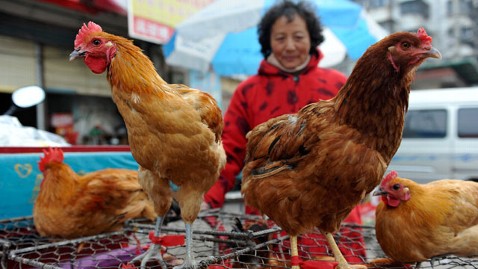New Bird Flu Strain Kills 2 in Shanghai

A vendor waits for customers near chicken cages at a market in Fuyang city, in central China's Anhui province on March 31, 2013. (Credit: AP Photo)
Two men in Shanghai died after they became infected with a strain of avian flu not seen before in humans. A Chinese woman who contracted the same strain of flu - H7N9 - remains in critical condition, according to a statement released Sunday by China's National Health and Family Planning Commission.
The commission also said it was unclear how all three had become infected but that they'd all showed the same symptoms: a high fever and cough, which later developed into severe pneumonia along with difficulty in breathing.
The two Shanghai men, 87 and 27 years old, became sick in mid-February and died in early March. The third case, a 35-year-old woman from neighboring Anhui province, fell ill on March 9.
The older man's two sons were reportedly sick with severe pneumonia at the same time at the same time as his illness. The younger son died in March, while the older son recovered and is now out of the hospital. The authorities did not find the H7N9 strain of bird flu in either of the sons, but they are still investigating whether there is any connection between the father's illness and his sons'.
The commission said it doesn't believe that the H7N9 strain of bird flu is spread easily among humans, stating that 88 people who were in close contact with the three victims did not appear to have been infected.
A failed government cover-up of the SARS - severe acute respiratory syndrome - epidemic has aroused suspicions, leaving some Chinese to question why the government waited 20 days to announce the two deaths from H7N9.
By way of explanation, the government said the H7N9 strain was new, and had yet to be included in China's reporting system for infectious diseases. That's why it took authorities longer to make the diagnosis and announce the results.
Medical experts have advised citizens to wash their hands more often and avoid having contact with dead animals to avoid infection.
In March, 110,000 dead pigs were fished out of the Huangpu River, the main source of drinking water for residents of Shanghai, China's largest city. The government has not drawn any connection so far between the pigs and the H7N9 strain.
When the Shanghai Animal Disease Prevention and Control Center tested 34 samples from the pig carcasses Monday, it found no bird flu viruses, according to a government statement reported by Xinhua News Agency.